| Euro 'slides' as President Macron calls elections in France French president unveils ambitious plan to 'revive' European economy |
The wave of anger spread
The French election campaign kicked off on June 17 after a weekend of tense, violent protests and dissension in French society, particularly for the far-right National Rally party, which made a splash by winning a landslide in the European Parliament and forcing a snap vote.
The far-right National Rally party has enjoyed a huge success, winning a record number of votes in the European Parliament. This not only strengthens their position in domestic politics but also highlights the concerns and changes in the European political landscape.
Hundreds of thousands of people protested on June 15 against the rise of nationalism, led by Marine Le Pen of the French National Front, along with presidential candidate Jordan Bardella, 28.
Around 250,000 people gathered for protests in Paris and other cities across France, according to Le Monde newspaper, citing police estimates. However, the CGT trade union said as many as 640,000 people took part in protests nationwide.
 |
| Protesters gather during an anti-far-right demonstration in Paris on June 15, 2024 (Photo: CNBC) |
The protests were aimed at countering the rise of nationalism, a movement promoted by Marine Le Pen and National Front presidential candidate Jordan Bardella. Protesters believe that nationalism threatens France's unity and cultural diversity.
This protest is a clear sign of public dissatisfaction and desire for change. It also highlights the importance of protecting democratic values and human rights in today's society.
Unrest in France has escalated, with police using tear gas to disperse some protesters, after President Emmanuel Macron dissolved parliament following his party's heavy defeat in the European Union elections.
President Macron's decision to dissolve the National Assembly was a strong response to the unrest and large protests taking place in France. This has escalated tensions as protests and clashes have occurred.
The disappointing results of the European Union elections have left President Macron's Renaissance Party facing public discontent and opposition. These changes are seriously affecting France's internal situation and the stability of the country.
President Macron also faces major challenges in maintaining stability and public support, raising questions about his ability to govern and his policies during a difficult period for European politics and economics.
Tense election race
The far-right National Rally is currently leading the polls with support rising to 35%. With less than two weeks to go until the first round of voting on June 30, the party has a big advantage in the second round.
In second place is the New People's Front, a left-wing coalition, with 26 percent support. Although they are not in the lead, they still have a chance to compete strongly.
President Macron's Renaissance Party is currently in third place with 18% support. Although it has slowed down after the previous two waves, it still has a chance to change the situation.
If no candidate wins a majority of votes in the first round of voting, a second round of voting will be held on July 7. This is the last chance for voters and their candidates to win this election.
The European managing director of Eurasia Group said that if the far right wins a majority in the French election, it would be an unprecedented problem. He also warned that this could lead to major economic risks for France.
President Macron's political strategy in the context of a possible "hung parliament" - that is, no policy is clearly implemented. His aim is to discredit the far-right National Rally party before the 2027 presidential election.
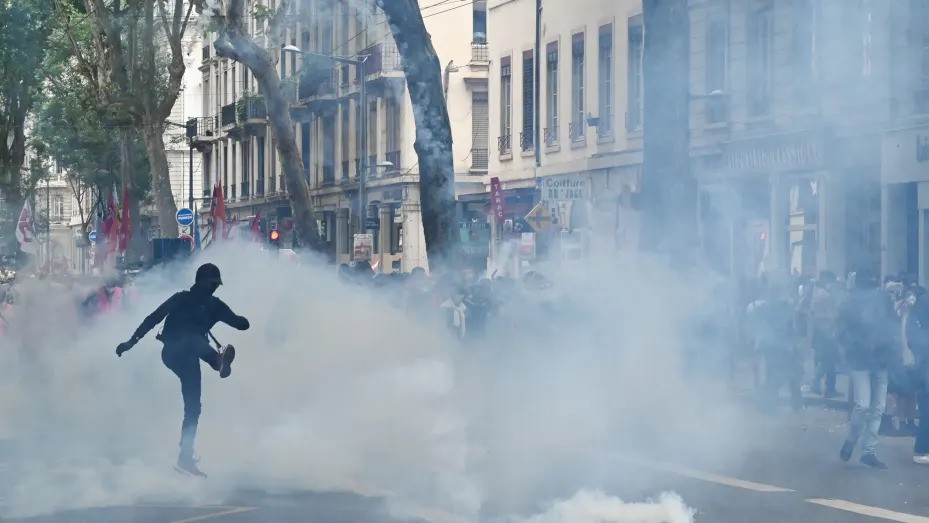 |
| A protester dressed in black kicks back a tear gas canister fired by police during a protest against fascism and the far-right National Rally party in Lyon, France, June 16, 2024. (Photo: CNBC) |
The recent financial market situation in France has been volatile, with the CAC 40 index falling more than 6.2% over the past week. This sharp decline suggests that advisors are worried about the current economic and political situation. Factors such as slowing economic growth, policy uncertainty and political instability may contribute to the market weakness.
French stocks rose at the start of the week, as Goldman Sachs' senior European strategist Sharon Bell said the sell-off may be premature.
“I think the sell-off in French stocks is a bit of a knee-jerk reaction,” Sharon Bell told CNBC’s “Squawk Box Europe.” “We think the most vulnerable players are the small-cap domestic companies.”
However, some analysts say the French market could remain volatile in the run-up to the election. Societe Generale noted that uncertainty over the financial plans of the candidates and the parties could drag on, so advisers may continue to face volatility and reconsider their investment strategies in the coming period.
Source: https://congthuong.vn/cuoc-dua-vou-cu-o-phap-cang-thang-truoc-lan-song-bieu-tinh-chinh-tri-326755.html


![[Photo] Readers line up to visit the photo exhibition and receive a special publication commemorating the 135th birthday of President Ho Chi Minh at Nhan Dan Newspaper](https://vphoto.vietnam.vn/thumb/1200x675/vietnam/resource/IMAGE/2025/5/17/85b3197fc6bd43e6a9ee4db15101005b)



![[Photo] Prime Minister Pham Minh Chinh chairs meeting on science and technology development](https://vphoto.vietnam.vn/thumb/1200x675/vietnam/resource/IMAGE/2025/5/17/ae80dd74c384439789b12013c738a045)
![[Photo] More than 17,000 candidates participate in the 2025 SPT Competency Assessment Test of Hanoi National University of Education](https://vphoto.vietnam.vn/thumb/1200x675/vietnam/resource/IMAGE/2025/5/17/e538d9a1636c407cbb211b314e6303fd)
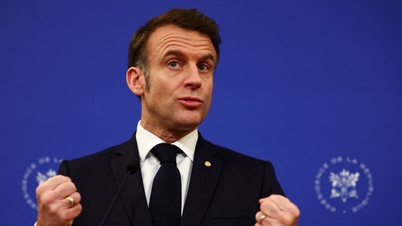

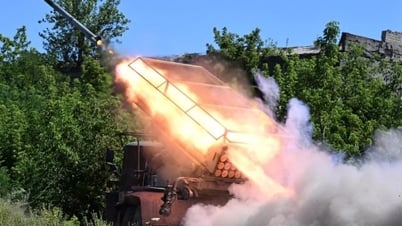



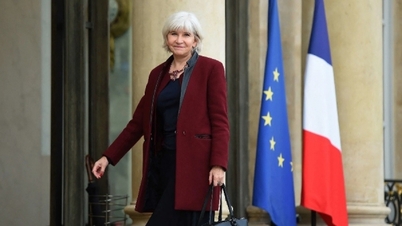
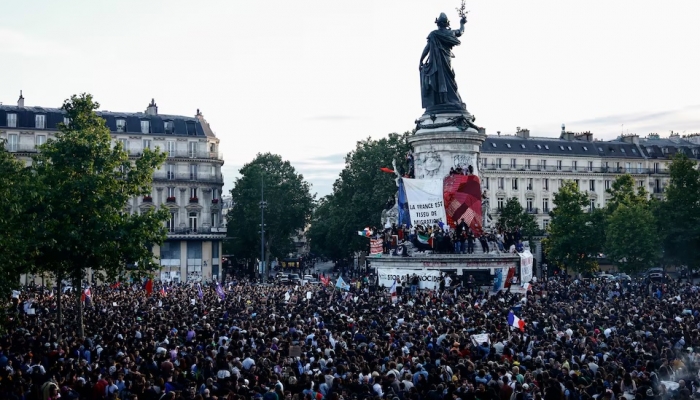





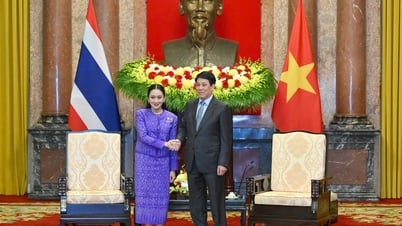


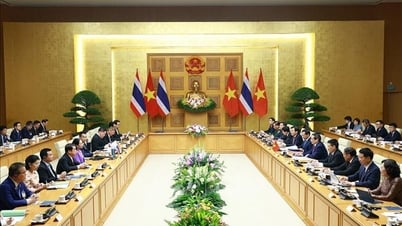








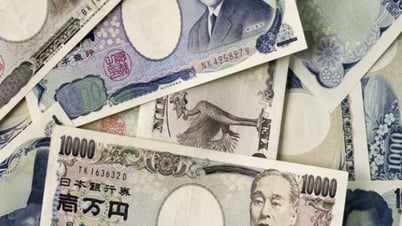
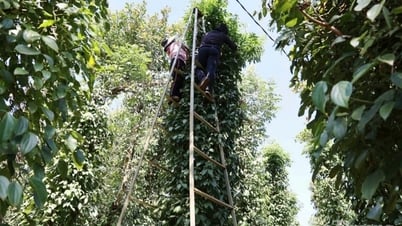
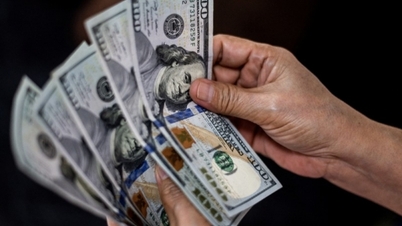

![[Photo] Nearly 3,000 students moved by stories about soldiers](https://vphoto.vietnam.vn/thumb/1200x675/vietnam/resource/IMAGE/2025/5/17/21da57c8241e42438b423eaa37215e0e)




















































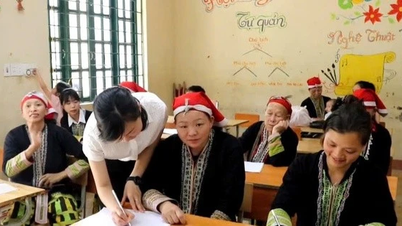





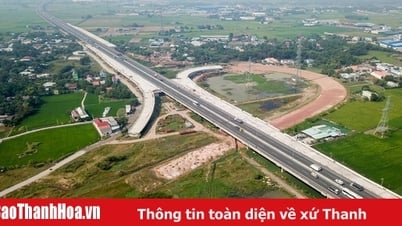











Comment (0)